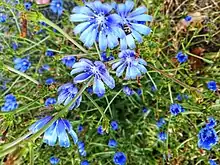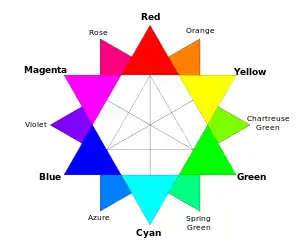Shades of azure
Azure (/ˈæʒər, ˈæz.jʊər/ AZH-ər, AZ-yoor)[2] is a variation of blue that is often described as the color of the sky on a clear day.
| Azure | |
|---|---|
 | |
| Hex triplet | #0080FF |
| HSV (h, s, v) | (210°, 100%, 100%) |
| sRGBB (r, g, b) | (0, 128, 255) |
| Source | On the RGB color wheel, Azure is defined as the colour halfway between blue and cyan. The colour halfway between blue and cyan on the RGB color wheel has a hex code of 0080FF.[1] |
| ISCC–NBS descriptor | Vivid blue |
| B: Normalized to [0–255] (byte) | |

On the RGB color wheel, "azure" (hexadecimal #0080FF) is defined as the color at 210 degrees, i.e., the hue halfway between blue and cyan. In the RGB color model, used to create all the colors on a television or computer screen, azure is created by adding a little green light to blue light. The complementary color of azure is orange.
In the X11 color system which became a standard for early web colors, azure is depicted as a pale cyan or white cyan.
Wrapping the spectrum into a color wheel
In a color proximity sense, a primary color has a color range of 120° (60° on each side of the color's hue) and any color has to be within that range to be considered a variation of that color. Secondary colors have a color range of 60° (30°), tertiary colors have a color range of 30° (15°), quaternary colors have a color range of 15° (7.5°), quinary colors have a color range of 7.5° (3.75°), and so on. Because cyan is located at a hue angle of 210°, it has a tertiary color range of 195° and 225°, and any color out of this range is more related to cyan or blue than azure.
If the visible spectrum is wrapped to form a color wheel, cyan (subtractive primary) appears midway between blue and cyan, or violet and spring green:


Distinction between indigo, azure and cyan
All of the colors shown below in the section variations of azure are referenced as having a hue code of between 195 and 225 (the hue code is the h code in the HSV color space), signifying that these colors are tones of azure. The only exception, as noted below, is the web color azure which, with a color code of 180, is actually a tone of cyan.
Strictly speaking, according to the mathematical logic of the RGB color wheel, indigo colors are those colors with hue codes of between 255 and 225, azure colors are those colors with hue codes of between 195 and 225, and cyan colors are those colors with hue codes of between 165 and 195.
Variations of azure
Alice blue
| Alice Blue | |
|---|---|
| Hex triplet | #F0F8FF |
| HSV (h, s, v) | (208°, 6%, 100%) |
| sRGBB (r, g, b) | (240, 248, 255) |
| Source | X11[3] |
| ISCC–NBS descriptor | Greenish white |
| B: Normalized to [0–255] (byte) H: Normalized to [0–100] (hundred) | |
The web color Alice blue is a pale tint of azure.
Light sky blue
| Light Sky Blue | |
|---|---|
| Hex triplet | #87CEFA |
| HSV (h, s, v) | (203°, 46%, 98%) |
| sRGBB (r, g, b) | (135, 206, 250) |
| Source | X11 color names |
| ISCC–NBS descriptor | Brilliant greenish blue |
| B: Normalized to [0–255] (byte) H: Normalized to [0–100] (hundred) | |
Displayed at right is the web color light sky blue.
Baby blue
| Baby Blue | |
|---|---|
| Hex triplet | #89CFF0 |
| HSV (h, s, v) | (199°, 43%, 94%) |
| sRGBB (r, g, b) | (137, 207, 240) |
| Source | Maerz and Paul[4] |
| ISCC–NBS descriptor | Very light greenish blue |
| B: Normalized to [0–255] (byte) H: Normalized to [0–100] (hundred) | |
Baby blue is known as one of the pastel colors.
This color is associated with baby boys in Western culture.
The first recorded use of baby blue as a color name in English was in 1892.[5]
Sky blue
| Sky Blue | |
|---|---|
| Common connotations | |
| boys, daylight, water, air, paleness | |
| Hex triplet | #87CEEB |
| HSV (h, s, v) | (197°, 43%, 92%) |
| sRGBB (r, g, b) | (135, 206, 235) |
| Source | X11 color names |
| ISCC–NBS descriptor | Very light greenish blue |
| B: Normalized to [0–255] (byte) H: Normalized to [0–100] (hundred) | |
Displayed at right is the web color sky blue.
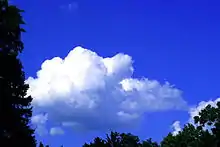
The first recorded use of sky blue as a color name in English was in 1728 in the Cyclopædia of Ephraim Chambers.[6] Prior to the Chambers reference, the color had first been used in 1585 in a book by Nicolas de Nicolay where he stated "the tulbant of the merchant must be skie coloured".[7][8]
Deep sky blue
| Deep Sky Blue | |
|---|---|
| Hex triplet | #00BFFF |
| HSV (h, s, v) | (195°, 100%, 100%) |
| sRGBB (r, g, b) | (0, 191, 255) |
| Source | X11 |
| ISCC–NBS descriptor | Brilliant greenish blue |
| B: Normalized to [0–255] (byte) H: Normalized to [0–100] (hundred) | |
Deep sky blue is an azure-cyan color associated with deep sky blue.
Deep sky blue is a web color.
This color is on the color wheel (RGB/HSV color wheel) halfway between azure and cyan.
The traditional name for this color is Capri.[9]
The first use of Capri as a color name in English was in 1920.[10]
The color Capri in general is named for the azure-cyan color of the Mediterranean Sea around the island of Capri off Italy, the site of several villas belonging to the Roman Emperor Tiberius, including his imperial residence in his later years, the Villa Jovis. Specifically, the color Capri is named after the color of the Blue Grotto on the island of Capri[11] as it appears on a bright sunny day. Today the island of Capri is a resort island popular with tourists.
The name deep sky blue for this color did not come into use until the promulgation of the X11 color list in 1987.
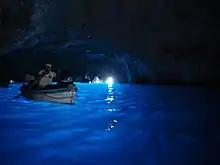
The name Capri is still used for this color as well as the name deep sky blue.
Cerulean
| Cerulean | |
|---|---|
| Hex triplet | #007BA7 |
| HSV (h, s, v) | (196°, 100%, 65%) |
| sRGBB (r, g, b) | (0, 123, 167) |
| Source | [Unsourced] |
| ISCC–NBS descriptor | Strong greenish blue |
| B: Normalized to [0–255] (byte) H: Normalized to [0–100] (hundred) | |
The first recorded use of cerulean as a color name in English was in 1590.[12]
The word is probably derived from the Latin word caeruleus, "dark blue, blue, or blue-green", which in turn probably derives from caelulum, diminutive of caelum, "heaven, sky".[13]
Pale azure
| Pale azure | |
|---|---|
| Hex triplet | #87D3F8 |
| HSV (h, s, v) | (200°, 46%, 97%) |
| sRGBB (r, g, b) | (135, 211, 248) |
| Source | X11 |
| ISCC–NBS descriptor | Very light greenish blue |
| B: Normalized to [0–255] (byte) H: Normalized to [0–100] (hundred) | |
Green-blue
| Green-blue | |
|---|---|
| Hex triplet | #1164B4 |
| HSV (h, s, v) | (209°, 90.6%, 70.6[14]%) |
| sRGBB (r, g, b) | (17, 100, 180) |
| Source | Crayola |
| ISCC–NBS descriptor | Strong blue |
| B: Normalized to [0–255] (byte) H: Normalized to [0–100] (hundred) | |
Green-blue was a Crayola color from 1958 to 1990.
Maya blue
| Maya Blue | |
|---|---|
| Hex triplet | #73C2FB |
| HSV (h, s, v) | (205°, 54%, 98%) |
| sRGBB (r, g, b) | (115, 194, 251) |
| Source | [Unsourced] |
| ISCC–NBS descriptor | Light blue |
| B: Normalized to [0–255] (byte) H: Normalized to [0–100] (hundred) | |
Maya blue was a pigment widely used by the Mayan civilization.
Jordy blue
| Jordy Blue | |
|---|---|
| Hex triplet | #8AB9F1 |
| HSV (h, s, v) | (213°, 40%, 74%) |
| sRGBB (r, g, b) | (138, 185, 241) |
| Source | Xona.com Color List |
| ISCC–NBS descriptor | Light blue |
| B: Normalized to [0–255] (byte) H: Normalized to [0–100] (hundred) | |
At right is displayed the color jordy blue.
The color name jordy blue has been in use since 2001, when this color was promulgated as one of the colors on the Xona.com Color List.
Columbia blue
| Columbia Blue | |
|---|---|
| Hex triplet | #B9D9EB |
| HSV (h, s, v) | (202°, 21%, 92%) |
| sRGBB (r, g, b) | (185, 217, 235) |
| Source | Columbia University[15] |
| ISCC–NBS descriptor | Very light greenish blue |
| B: Normalized to [0–255] (byte) H: Normalized to [0–100] (hundred) | |
Columbia blue is a medium light tone of azure named after Columbia University. The typical Columbia blue is defined by Pantone Columbia Blue (PANTONE 290).[16]
Picton blue
| Picton Blue | |
|---|---|
| Hex triplet | #45B1E8 |
| HSV (h, s, v) | (200°, 70%, 91%) |
| sRGBB (r, g, b) | (69, 177, 232) |
| Source | Xona.com Color List |
| ISCC–NBS descriptor | Brilliant greenish blue |
| B: Normalized to [0–255] (byte) H: Normalized to [0–100] (hundred) | |
At right is displayed the color picton blue.
The color name picton blue dates back to at least 2001, and came into wider use when the Resene Paints colors were used as one of the sources for the Xona Games Color List.[17]
United Nations blue
| United Nations Blue | |
|---|---|
| Hex triplet | #4B92DB |
| HSV (h, s, v) | (210°, 66%, 86%) |
| sRGBB (r, g, b) | (75, 146, 219) |
| Source | Vexillological |
| ISCC–NBS descriptor | Strong blue |
| B: Normalized to [0–255] (byte) H: Normalized to [0–100] (hundred) | |
Displayed at right is the color United Nations blue.
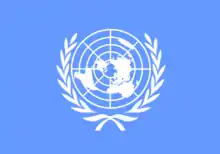
The color resembles the shade of blue seen on the flag of the United Nations.
Cornflower blue
| Cornflower Blue | |
|---|---|
| Hex triplet | #6495ED |
| HSV (h, s, v) | (219°, 58%, 93%) |
| sRGBB (r, g, b) | (100, 149, 237) |
| Source | X11 |
| ISCC–NBS descriptor | Brilliant blue |
| B: Normalized to [0–255] (byte) H: Normalized to [0–100] (hundred) | |
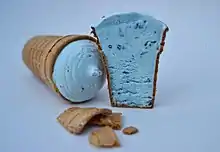
At right is displayed the web color cornflower blue.
Bleu de France
| Bleu de France | |
|---|---|
| Hex triplet | #318CE7 |
| HSV (h, s, v) | (210°, 79%, 91%) |
| sRGBB (r, g, b) | (49, 140, 231) |
| Source | Pourpre.com |
| ISCC–NBS descriptor | Vivid blue |
| B: Normalized to [0–255] (byte) H: Normalized to [0–100] (hundred) | |
The color bleu de France is displayed at right.
Bleu de France is a color that has been associated in heraldry with the Kings of France since the 12th century.
Dodger blue
| Dodger Blue | |
|---|---|
| Hex triplet | #1E90FF |
| HSV (h, s, v) | (210°, 88%, 100%) |
| sRGBB (r, g, b) | (30, 144, 255) |
| Source | X11 |
| ISCC–NBS descriptor | Vivid blue |
| B: Normalized to [0–255] (byte) H: Normalized to [0–100] (hundred) | |
At right is displayed the color Dodger blue.
Brandeis blue
| Brandeis Blue | |
|---|---|
| Hex triplet | #0070FF |
| HSV (h, s, v) | (214°, 100%, 100%) |
| sRGBB (r, g, b) | (0, 112, 255) |
| Source | Internet |
| ISCC–NBS descriptor | Vivid blue |
| B: Normalized to [0–255] (byte) H: Normalized to [0–100] (hundred) | |
Brandeis blue is the tone of azure used in association with Brandeis University.
The university administration defines Brandeis blue as corresponding to the Pantone color of 294 or the process color of 100c 86m 14y w24k.[18]
True blue
| True Blue | |
|---|---|
| Hex triplet | #2D68C4 |
| HSV (h, s, v) | (217°, 77%, 76.9%) |
| sRGBB (r, g, b) | (45, 104, 196) |
| Source | UCLA Athletics website |
| ISCC–NBS descriptor | Vivid blue |
| B: Normalized to [0–255] (byte) H: Normalized to [0–100] (hundred) | |
The color true blue is a deep tone of azure that is the color of the uniforms of the sports teams of UCLA. It is also one of the shades of blue used by the Los Angeles Chargers though they use the name powder blue.
Tang blue
| Tang Blue | |
|---|---|
| Hex triplet | #0059CF |
| HSV (h, s, v) | (214°, 100%, 81%) |
| sRGBB (r, g, b) | (0, 89, 207) |
| Source | ColorHex |
| ISCC–NBS descriptor | Vivid blue |
| B: Normalized to [0–255] (byte) | |
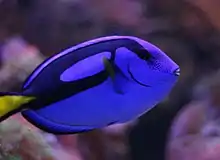
The color tang blue is a deep tone of azure that is the color of royal blue tang fish.
Royal blue (web color)
| Royal Blue (web color) | |
|---|---|
| Hex triplet | #4169E1 |
| HSV (h, s, v) | (225°, 71%, 88%) |
| sRGBB (r, g, b) | (65, 105, 225) |
| Source | X11 |
| ISCC–NBS descriptor | Vivid blue |
| B: Normalized to [0–255] (byte) H: Normalized to [0–100] (hundred) | |
The web color royal blue is a rich tone of azure.
Celestial blue
| Celestial Blue | |
|---|---|
| Hex triplet | #4997D0 |
| HSV (h, s, v) | (205°, 65%, 81%) |
| sRGBB (r, g, b) | (73, 151, 208) |
| Source | Plochere |
| ISCC–NBS descriptor | Light blue |
| B: Normalized to [0–255] (byte) H: Normalized to [0–100] (hundred) | |
Displayed at right is the color celestial blue.
The first recorded use of celestial blue as a color name in English was in 1535.[19]
The source of this color is the Plochere Color System, a color system formulated in 1948 that is widely used by interior designers.[20]
Vista blue
| Vista Blue | |
|---|---|
| Hex triplet | #7C9ED9 |
| HSV (h, s, v) | (218°, 43%, 85[21]%) |
| sRGBB (r, g, b) | (124, 158, 217) |
| Source | Pantone TPX[22] |
| ISCC–NBS descriptor | Light blue |
| B: Normalized to [0–255] (byte) H: Normalized to [0–100] (hundred) | |
Displayed at right is the color vista blue.
The source of this color is the "Pantone Textile Paper eXtended (TPX)" color list, color #15-3930 TPX—Vista Blue.[23]
Silver Lake blue
| Silver Lake Blue | |
|---|---|
| Hex triplet | #5D89BA |
| HSV (h, s, v) | (212°, 50%, 73%) |
| sRGBB (r, g, b) | (93, 137, 186) |
| Source | Pantone TPX[24] |
| ISCC–NBS descriptor | Moderate blue |
| B: Normalized to [0–255] (byte) H: Normalized to [0–100] (hundred) | |
Displayed at right is the color Silver Lake blue.
The source of this color is the "Pantone Textile Paper eXtended (TPX)" color list, color #17-4030 TPX—Silver Lake Blue.[25]
Tufts blue
| Tufts Blue | |
|---|---|
| Hex triplet | #3E8EDE |
| HSV (h, s, v) | (210°, 70.7%, 87.1%) |
| sRGBB (r, g, b) | (62, 142, 222) |
| Source | |
| ISCC–NBS descriptor | Strong blue |
| B: Normalized to [0–255] (byte) H: Normalized to [0–100] (hundred) | |
Tufts blue is the tone of azure used in association with Tufts University.
Honolulu blue
| Honolulu Blue | |
|---|---|
| Hex triplet | #0076B6 |
| HSV (h, s, v) | (201°, 100%, 71%) |
| sRGBB (r, g, b) | (0, 118, 182) |
| Source | [26] |
| ISCC–NBS descriptor | Strong blue |
| B: Normalized to [0–255] (byte) H: Normalized to [0–100] (hundred) | |
Honolulu blue is the tone of azure used in association with the Detroit Lions football team.
Air Force blue
| Air Force Blue | |
|---|---|
| Hex triplet | #5D8AA8 |
| HSV (h, s, v) | (204°, 45%, 66%) |
| sRGBB (r, g, b) | (93, 138, 168) |
| Source | Vexillological:[27] |
| ISCC–NBS descriptor | Moderate greenish blue |
| B: Normalized to [0–255] (byte) H: Normalized to [0–100] (hundred) | |
Displayed at right is the color air force blue, also known as RAF blue. This is the tone of air force blue used by the Royal Air Force, the first air force to choose an "air force blue" color by which to identify itself, in 1920.
The color "air force blue" is a medium tone of azure since it has a hue code of 204 which is a hue code between 195 and 225, signifying a tone of azure.
Steel blue
| Steel Blue | |
|---|---|
| Hex triplet | #4682B4 |
| HSV (h, s, v) | (207°, 61%, 71%) |
| sRGBB (r, g, b) | (70, 130, 180) |
| Source | X11 |
| ISCC–NBS descriptor | Moderate blue |
| B: Normalized to [0–255] (byte) H: Normalized to [0–100] (hundred) | |
Steel blue is a grayish tone of azure that resembles the color blue steel, i.e., steel which has been subjected to bluing in order to protect it from rust.
The first recorded use of steel blue as a color name in English was in 1817.[28]
French blue
| French Blue | |
|---|---|
| Hex triplet | #0072BB |
| HSV (h, s, v) | (203°, 100%, 73%) |
| sRGBB (r, g, b) | (0, 114, 187) |
| Source | Maerz and Paul |
| ISCC–NBS descriptor | Strong blue |
| B: Normalized to [0–255] (byte) H: Normalized to [0–100] (hundred) | |
French blue[29] is a deep azure color commonly used in quality men's dress shirts.
According to the Oxford English Dictionary, the first use of French Blue in English was in The Times of 1802.[30]
Lapis lazuli
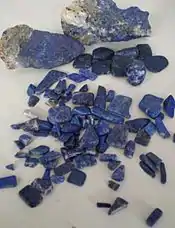
| Lapis Lazuli | |
|---|---|
| Hex triplet | #26619C |
| HSV (h, s, v) | (210°, 76%, 61%) |
| sRGBB (r, g, b) | (38, 97, 156) |
| Source | Pourpre.comnot specific enough to verify] |
| ISCC–NBS descriptor | Moderate blue |
| B: Normalized to [0–255] (byte) H: Normalized to [0–100] (hundred) | |
The color lapis lazuli is displayed at left.
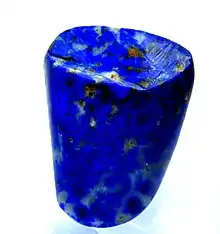
Lapis Lazuli is a color that is a representation of the most common color of lapis lazuli.
Royal blue (traditional)
| Royal blue (traditional) | |
|---|---|
| Hex triplet | #002366 |
| HSV (h, s, v) | (219°, 100%, 40%) |
| sRGBB (r, g, b) | (0, 35, 102) |
| Source | John C. Foster "Color names starting with ROSE through RUST" Texas Precancel Club |
| ISCC–NBS descriptor | Deep blue |
| B: Normalized to [0–255] (byte) H: Normalized to [0–100] (hundred) | |
The traditional color called royal blue is a dark shade of azure.
Fluorescent blue
| Fluorescent blue | |
|---|---|
| Hex triplet | #15F4EE |
| HSV (h, s, v) | (178°, 91%, 96%) |
| sRGBB (r, g, b) | (21, 244, 238) |
| Source | [Unsourced] |
| ISCC–NBS descriptor | Brilliant bluish green |
| B: Normalized to [0–255] (byte) H: Normalized to [0–100] (hundred) | |
Fluorescent blue is a shade of blue that is radiant based on fluorescence. This is the main color on the Indian 50-rupee note.

Ice blue
| Ice Blue | |
|---|---|
| Hex triplet | #99FFFF |
| HSV (h, s, v) | (180°, 40%, 100%) |
| sRGBB (r, g, b) | (153, 255, 255) |
| Source | Corel[31] |
| ISCC–NBS descriptor | Very light bluish green |
| B: Normalized to [0–255] (byte) | |
Ice blue is a light bluish green.

Powder blue
| Powder Blue | |
|---|---|
| Hex triplet | #B0E0E6 |
| HSV (h, s, v) | (187°, 23%, 90%) |
| sRGBB (r, g, b) | (176, 224, 230) |
| Source | X11[3] |
| ISCC–NBS descriptor | Very light bluish green |
| B: Normalized to [0–255] (byte) H: Normalized to [0–100] (hundred) | |
Powder blue is a light bluish green. The first recorded use of powder blue as a color name in English was in 1774.[32] It is a web color.
Light blue
| Light blue | |
|---|---|
| Hex triplet | #ADD8E6 |
| HSV (h, s, v) | (195°, 25%, 90%) |
| sRGBB (r, g, b) | (173, 216, 230) |
| Source | X11 |
| ISCC–NBS descriptor | Very light greenish blue |
| B: Normalized to [0–255] (byte) H: Normalized to [0–100] (hundred) | |
The web color light blue is part of the X11 color system, with a hue code of 194. This color is closer to cyan than to blue. Variations of this color are known as sky blue, baby blue, or angel blue.
The first recorded use of "light blue" as a color term in English is in the year 1915.[33]
Baby blue
| Baby blue | |
|---|---|
| Hex triplet | #89CFF0 |
| HSV (h, s, v) | (199°, 43%, 94%) |
| sRGBB (r, g, b) | (137, 207, 240) |
| Source | Maerz and Paul[34] |
| ISCC–NBS descriptor | Very light greenish blue |
| B: Normalized to [0–255] (byte) H: Normalized to [0–100] (hundred) | |
Baby blue is known as one of the pastel colors. With a hue code of 199, this color is a tone of azure.
The first recorded use of baby blue as a color name in English was in 1892.[35]
Duck blue
| Duck Blue | |
|---|---|
| Hex triplet | #007791 |
| HSV (h, s, v) | (191°, 100%, 57%) |
| sRGBB (r, g, b) | (0, 119, 145) |
| Source | ISCC-NBS |
| ISCC–NBS descriptor | Moderate greenish blue |
| B: Normalized to [0–255] (byte) | |
Duck blue is a moderate greenish blue.
Blue (NCS) (psychological primary blue)
| Blue (NCS) | |
|---|---|
| Hex triplet | #0087BD |
| HSV (h, s, v) | (197°, 100%, 74%) |
| sRGBB (r, g, b) | (0, 135, 189) |
| Source | sRGB approximation to NCS 2060-B[36] |
| ISCC–NBS descriptor | Moderate blue |
| B: Normalized to [0–255] (byte) | |

The color defined as blue in the NCS or Natural Color System is an azure-like color shown at right (NCS 2060-B). The Natural Color System is a color system based on the four unique hues or psychological primary colors red, yellow, green, and blue. The NCS is based on the opponent process theory of vision.
The “Natural Color System” is widely used in Scandinavia.
Blue (Munsell)
| Blue (Munsell) | |
|---|---|
| Hex triplet | #0093AF |
| HSV (h, s, v) | (190°, 100%, 69%) |
| sRGBB (r, g, b) | (0, 147, 175) |
| Source | Munsell Color Wheel |
| ISCC–NBS descriptor | Strong greenish blue |
| B: Normalized to [0–255] (byte) | |

The color defined as blue in the Munsell color system (Munsell 5B) is shown at right. The Munsell color system is a color space that specifies colors based on three color dimensions: hue, value (lightness), and chroma (color purity), spaced uniformly (according to the logarithmic scale which governs human perception) in three dimensions in the Munsell color solid, which is shaped like an elongated oval at an angle. In order for all the colors to be spaced uniformly, it was found necessary to use a color wheel with five primary colors: red, yellow, green, blue, and purple.
Munsell can only be displayed approximately on a computer screen, as these spectral colors have been adjusted to fit into the sRGB gamut. In the 21st century, this hue is classified as an intermediate between azure and cyan.
Teal blue
| Teal blue | |
|---|---|
| Hex triplet | #367588 |
| HSV (h, s, v) | (194°, 60%, 53%) |
| sRGBB (r, g, b) | (54, 117, 136) |
| Source | Kelly, Kenneth L. and Judd, Deanne B. (December 1976) "Color: Universal Language and Dictionary of Names", National Bureau of Standards, Spec. Publ. 440 |
| ISCC–NBS descriptor | Moderate greenish blue |
| B: Normalized to [0–255] (byte) H: Normalized to [0–100] (hundred) | |
Teal blue is a medium tone of teal with more blue. The first recorded use of teal blue as a color name in English was in 1927.[37]
Uranian blue
| Uranian Blue | |
|---|---|
| Hex triplet | #AFDBF5 |
| HSV (h, s, v) | (202°, 29%, 96%) |
| sRGBB (r, g, b) | (175, 216, 245) |
| Source | Color-Hex |
| ISCC–NBS descriptor | Very light greenish blue |
| B: Normalized to [0–255] (byte) H: Normalized to [0–100] (hundred) | |
Uranian blue is a light greenish blue, the color of Uranus.

In this section, the term shade is used in its technical sense as used in color theory, meaning a blueish color mixed with black or dark gray. The colors arranged in order of their value (brightness) (V in the HSV code), the brighter colors toward the top and the darker colors toward the bottom.
Spanish blue
| Spanish Blue | |
|---|---|
| Hex triplet | #0070BB |
| HSV (h, s, v) | (203°, 100%, 72%) |
| sRGBB (r, g, b) | (0, 112, 184) |
| Source | Gallego and Sanz[38] |
| ISCC–NBS descriptor | Strong blue |
| B: Normalized to [0–255] (byte) | |
Spanish blue is the color that is called Azul (the Spanish word for "blue") in the Guía de coloraciones (Guide to colorations) by Rosa Gallego and Juan Carlos Sanz, a color dictionary published in 2005 that is widely popular in the Hispanophone realm. It is a shade of azure.
Argentinian blue
| Argentinian Blue | |
|---|---|
| Hex triplet | #6CB4EE |
| HSV (h, s, v) | (206°, 55%, 93%) |
| sRGBB (r, g, b) | (108, 180, 238) |
| Source | [Unsourced] |
| ISCC–NBS descriptor | Light blue |
| B: Normalized to [0–255] (byte) H: Normalized to [0–100] (hundred) | |
The web color Argentinian blue is a light azure color seen on the national flag of Argentina.

Berkeley blue
| Berkeley Blue | |
|---|---|
 | |
| Hex triplet | #003262 |
| HSV (h, s, v) | (209°, 100.0%, 38.4%) |
| sRGBB (r, g, b) | (0, 50, 98) |
| Source | Berkeley branding guidelines |
| ISCC–NBS descriptor | Deep blue |
| B: Normalized to [0–255] (byte) H: Normalized to [0–100] (hundred) | |
Berkeley Blue is one of the official colors of the University of California, Berkeley, along with California Gold.[39] Until 2007, the university had used Yale Blue in its place, given Berkeley's historical ties to Yale University, particularly in its founding.[40] Berkeley's school colors are the originators for those of all the campuses in the University of California system, of which Berkeley is the oldest as its flagship.
Blue (Crayola)
| Blue (Crayola) | |
|---|---|
| Hex triplet | #1F75FE |
| HSV (h, s, v) | (217°, 88%, 100[41]%) |
| sRGBB (r, g, b) | (31, 117, 254) |
| Source | Crayola |
| ISCC–NBS descriptor | Vivid blue |
| B: Normalized to [0–255] (byte) H: Normalized to [0–100] (hundred) | |
Blue (Crayola) is the color called blue in Crayola crayons.
"Blue" was one of the original Crayola crayons formulated in 1903.
Ruddy blue
| Ruddy Blue | |
|---|---|
| Hex triplet | #76ABDF |
| HSV (h, s, v) | (210°, 47%, 88%) |
| sRGBB (r, g, b) | (118, 171, 223) |
| Source | ColorSwatches |
| ISCC–NBS descriptor | Brilliant blue |
| B: Normalized to [0–255] (byte) H: Normalized to [0–100] (hundred) | |
Ruddy blue represents the coloring of the beak of the ruddy duck. It is a light shade of azure.
.jpg.webp)
Celtic blue
| Celtic Blue | |
|---|---|
| Hex triplet | #246BCE |
| HSV (h, s, v) | (215°, 83%, 81%) |
| sRGBB (r, g, b) | (36, 107, 206) |
| Source | Encycolorpedia |
| ISCC–NBS descriptor | Vivid blue |
| B: Normalized to [0–255] (byte) H: Normalized to [0–100] (hundred) | |
Celtic blue is a shade of blue, also known as glas celtig in Welsh, or gorm ceilteach in both the Irish language and in Scottish Gaelic. Julius Caesar reported (in Commentarii de Bello Gallico) that the Britanni used to colour their bodies blue with vitrum, a word that means primarily "glass", but also the domestic name for the "woad" (Isatis tinctoria), besides the Gaulish loanword glastum (from Proto-Celtic *glastos "green"). The connection seems to be that both glass and the woad are "water-like" (lat. vitrum is from Proto-Indo-European *wed-ro- "water-like").
Bleu de France
| Bleu de France | |
|---|---|
| Hex triplet | #318CE7 |
| HSV (h, s, v) | (210°, 79%, 91%) |
| sRGBB (r, g, b) | (49, 140, 231) |
| Source | Pourpre.com |
| ISCC–NBS descriptor | Vivid blue |
| B: Normalized to [0–255] (byte) H: Normalized to [0–100] (hundred) | |
Bleu de France is a vivid blue color that has been associated in heraldry with the Kings of France since the 12th century.
Polynesian blue
| Polynesian Blue | |
|---|---|
| Hex triplet | #224C98 |
| HSV (h, s, v) | (218°, 78%, 60%) |
| sRGBB (r, g, b) | (34, 76, 152) |
| Source | ColorSwatches |
| ISCC–NBS descriptor | Vivid blue |
| B: Normalized to [0–255] (byte) H: Normalized to [0–100] (hundred) | |
Polynesian blue is a dark blue color, almost navy.
Maroccan Blue
| Chefchaouen Blue | |
|---|---|
| Hex triplet | #468fea |
| HSV (h, s, v) | (213°, 70%, 92%) |
| sRGBB (r, g, b) | (70, 143, 234) |
| Source | Color-Hex |
| ISCC–NBS descriptor | Vivid blue |
| B: Normalized to [0–255] (byte) | |
Maroccan blue (also Chefchaouen blue) is a vivid blue color.
Yale Blue
| Yale "Blue Site" Blue | |
|---|---|
| Hex triplet | #00356B |
| HSV (h, s, v) | (210°, 100%, 42%) |
| sRGBB (r, g, b) | (0, 53, 107) |
| Source | Identity Guidelines |
| ISCC–NBS descriptor | Deep blue |
| B: Normalized to [0–255] (byte) H: Normalized to [0–100] (hundred) | |
Yale Blue is the dark azure color used in association with Yale University. The hue of Yale Blue is one of the two official colors of Indiana State University,[42] the University of Mississippi,[43] and Southern Methodist University.[44] The official color "DCU Blue" of Dublin City University is very close to Yale Blue.[45]
Yale Blue was also an official color of University of California, Berkeley[40] and Duke University.[46]
Penn blue
| University of Pennsylvania Blue | |
|---|---|
 | |
| Hex triplet | #011F5B |
| HSV (h, s, v) | (220°, 98.9%, 35.7%) |
| sRGBB (r, g, b) | (1, 31, 91) |
| Source | Penn branding guidelines |
| ISCC–NBS descriptor | Deep purplish blue |
| B: Normalized to [0–255] (byte) H: Normalized to [0–100] (hundred) | |
Penn Blue is one of the official colors of the University of Pennsylvania, along with Penn Red. While the school colors were defined by 1910,[47] university history points to earlier times when the colors may have been chosen, including a possible visit by George Washington to the University, where students used the color of his tunic to determine school colors or a track meet where Penn athletes declared that they would wear the colors "of the teams we beat," which would be those of both Harvard University and Yale University.[48] Originally defined as the colors used on the American flag, the colors have since deviated.[47]
Sapphire
| Sapphire | |
|---|---|
| Hex triplet | #082567 |
| HSV (h, s, v) | (222°, 86%, 22%) |
| sRGBB (r, g, b) | (8, 37, 103) |
| Source | 99Colors |
| ISCC–NBS descriptor | Deep blue |
| B: Normalized to [0–255] (byte) H: Normalized to [0–100] (hundred) | |

Sapphire is a deep shade of navy blue, based on the color of an average sapphire gemstone. However, sapphires can also be pink, yellow, or orange.
Delft blue
| Delft Blue | |
|---|---|
| Hex triplet | #1F305E |
| HSV (h, s, v) | (224°, 67%, 37%) |
| sRGBB (r, g, b) | (31, 48, 94) |
| Source | Derwent |
| ISCC–NBS descriptor | Dark blue |
| B: Normalized to [0–255] (byte) H: Normalized to [0–100] (hundred) | |
Delft blue is a dark blue color. The name is derived from the Dutch pottery Delftware, also known simply as "Delft Blue".
Resolution blue
| Resolution Blue | |
|---|---|
| Hex triplet | #002387 |
| HSV (h, s, v) | (224°, 100%, 53%) |
| sRGBB (r, g, b) | (0, 35, 135) |
| Source | Xona.com Color List |
| ISCC–NBS descriptor | Vivid blue |
| B: Normalized to [0–255] (byte) | |
Resolution blue is a vivid blue color. This color name first came into use in 2001 when it was formulated as one of the colors on the Xona.com Color List.
References
- On colour plate 33 (page 89) of the 1930 book A Dictionary of Color by Maerz and Paul, the colours on the right side of colour plate 33 from top to bottom represent the most highly saturated colours on the color wheel from cyan to azure, and the colours on the bottom of colour plate 33 from right to left represent the most highly saturated colours on the colour wheel from azure to blue. The colour sample that represents azure is colour sample L12 on Plate 33 on Page 89. See reference to Azure on Page 190 in the index. See also discussion of the color azure, Page 149.
- Oxford Dictionary Online, Oxford US Dictionary
- W3C TR CSS3 Color Module, SVG color keywords
- The color displayed in the color box above matches the color called baby blue in the 1930 book by Maerz and Paul A Dictionary of Color New York:1930 McGraw-Hill; the color baby blue is displayed on page 93, Plate 35, Color Sample E2.
- Maerz and Paul A Dictionary of Color New York:1930 McGraw-Hill Page 190; Color Sample of Baby Blue: Page 93 Plate 35 Color Sample E2
- "sky-blue, n. and adj". Oxford English Dictionary. OUP. Retrieved 21 April 2011.
- "sky-coloured | sky-colored, adj". Oxford English Dictionary. OUP. Retrieved 21 April 2011.
- Maerz and Paul A Dictionary of Color New York:1930 McGraw-Hill Page 204; Color Sample of Sky Blue: Page 89 Plate 33 Color Sample E6
- Maerz and Paul A Dictionary of Color New York:1930 McGraw-Hill Color Sample of Capri: Page 93 Plate 35 Color Sample L7; The color Capri is shown as lying halfway between Cyan and Azure.
- Maerz and Paul A Dictionary of Color New York:1930 McGraw-Hill Page 191
- Maerz and Paul A Dictionary of Color New York:1930 McGraw-Hill Page 152 Discussion of the color Capri
- Maerz and Paul A Dictionary of Color New York:1930 McGraw-Hill Page 190; Color Sample of Cerulean: Page 89 Plate 33 Color Sample E6
- "cerulean | Search Online Etymology Dictionary". www.etymonline.com. Retrieved 26 October 2017.
- web.forret.com Color Conversion Tool set to hex code of color #1164B4 (Green-Blue):
- "Colors | Identity Guidelines". Retrieved 9 August 2018.
- "Colors | Identity Guidelines". Retrieved 9 August 2018.
- Doucette, Matthew. "Color List". Xona Games, Inc. Retrieved 11 February 2014.
- "Brandeis University Identity Manual" (PDF). brandeis.edu. 2013. p. 6. Retrieved 11 August 2018.
- Maerz and Paul A Dictionary of Color New York:1930 McGraw-Hill Page 192; Color Sample of Celestial blue: Page 93 Plate 35 Color Sample D3
- Plochere Color System: Archived 21 August 2010 at the Wayback Machine
- web.forret.com Color Conversion Tool set to hex code of color #7C9ED9 (Vista Blue):
- Type the words "Vista Blue" into the indicated window on the Pantone Color Finder and the color will appear.
- Pantone TPX Pantone Color Finder—Type the words "Vista Blue" into the indicated window on the Pantone Color Finder and the color will appear:
- Type the words "Silver Lake Blue" into the indicated window on the Pantone Color Finder and the color will appear.
- Pantone TPX Pantone Color Finder—Type the words "Silver Lake Blue" into the indicated window on the Pantone Color Finder and the color will appear:
- Detroit Lions Media Room
- History of the RAF, Chapter 7 – Cultural & Organizational Heritage, p. 370
- Maerz and Paul A Dictionary of Color New York:1930 McGraw-Hill Page 205
- Color Sample of French Blue on ISCC-NBS color chart (color sample #178):
- "French, adj. and n.". Oxford English Dictionary. OUP. Retrieved 21 April 2011.
- The color in this color box matches the color called ice blue in the software Corel Photo-Paint 8
- Maerz and Paul A Dictionary of Color New York:1930 McGraw-Hill Page 202. See color sample of powder blue, Page 95--Plate 36 Color Sample H2
- Maerz and Paul A Dictionary of Color New York:1930 McGraw-Hill Page 190
- The color displayed in this color box matches the color called baby blue in the 1930 book by Maerz and Paul A Dictionary of Color New York:1930 McGraw-Hill; the color baby blue is displayed on page 93, Plate 35, Color Sample E2.
- Maerz and Paul A Dictionary of Color New York:1930 McGraw-Hill Page 190; Color Sample of Baby Blue: Page 93 Plate 35 Color Sample E2
- The sRGB values are taken by converting the NCS color 2060-B using the “NCS Navigator” tool at the NCS website.
- Maerz, Aloys John and M. Rea Paul (1930) A Dictionary of Color, New York, McGraw-Hill, p. 205; color sample of Teal Blue: p. 101 Plate 39 Color Sample L6
- Gallego, Rosa; Sanz, Juan Carlos (2005). Guía de coloraciones (Gallego, Rosa; Sanz, Juan Carlos (2005). Guide to Colorations) Madrid: H. Blume. ISBN 84-89840-31-8
- Colors | UC Berkeley Brand Identity. brand.berkeley.edu. Retrieved on April 6, 2014.
- "History, Symbols, and Traditions: What are Cal's official colors?". University of California, Berkeley. 8 May 2007. Retrieved 3 December 2007.
- web.forret.com Color Conversion Tool set to hex code #1F75FE (Blue (Crayola)):
- "About - Indiana State University".
- "Ole Miss Traditions: Red & Blue". University of Mississippi. 1 October 2002. Retrieved 4 January 2012.
- "SMU SPIRIT AND TRADITIONS". Southern Methodist University. Retrieved 4 January 2012.
- "Public Affairs and Media Relations Office - corporate identity - DCU identity - DCU".
- "The origin of Duke Blue". Duke University Libraries. Retrieved 3 December 2007.
- "History of Penn Colors". University Archives and Records Center. University Archives and Records Center.
- "History and Traditions". University of Pennsylvania Athletics. University of Pennsylvania Athletics. Retrieved 28 March 2020.
Template:Shades of azure
